7 Easy Spanish Language Games
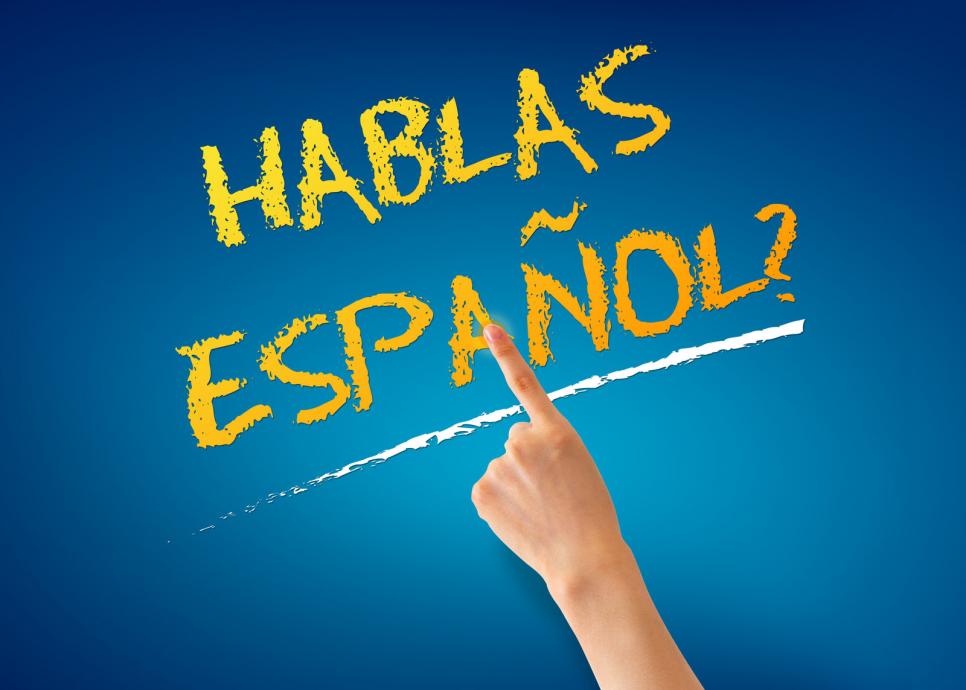 If you've always wanted to learn some Spanish, our 7 easy Spanish language games can give you a fun start.
If you've always wanted to learn some Spanish, our 7 easy Spanish language games can give you a fun start.
Spanish is a wonderful language to learn. It's spoken as an official language in 20 countries, and for many travels it's a great language to communicate and connect.
Spanish is a phonetic language, and is easy to pronounce for English speakers. Plus, Spanish shares many cognates with English and does not have a difficult word order.
Give a couple of these easy Spanish games a try. You can start with a few common greetings and expressions. Even if you speak only some basic phrases, making the effort will help you connect with Spanish speakers. And remember, in other-language countries, people don't always speak perfect English. They are sure to appreciate your efforts.
When playing a game, repeat the words of the speaker - out loud.
Just thinking about what to say in Spanish is not enough. Your mouth needs the practice to sound out the words. I call that "mouth mechanics".
1. Hello, Goodbye, etc.
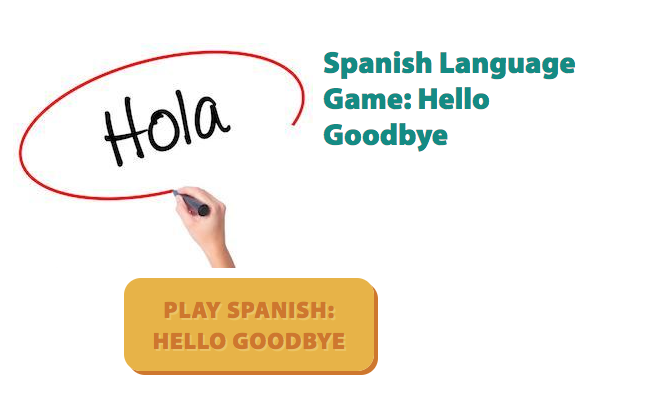 Greetings and polite phrases belong into your language tool kit. They are a friendly and respectful way to interact with others.
Greetings and polite phrases belong into your language tool kit. They are a friendly and respectful way to interact with others.
Play the game again a couple of days later to review what you learned.
You'll definitely feel more confident when you're in a Spanish-language setting when your responses are automatic and sound "like a native".
Click on our Spanish Language Game: Hello, Goodbye, etc. to learn and practice 10 must-have words and phrases.
Here's what you'll learn in Game 1:
• Hola - Hi
• Buenos días - Good morning
• Buenas tardes - Good afternoon
• Por favor - Please
• Gracias - Thanks
• De nada - You're welcome
• ¿Qué tal? - How are things?
• Lo siento - I'm sorry
• Momento - Just a moment
• Adiós - Goodbye
2. Spanish Numbers 1-20
 Learning the Spanish Numbers 1-20 is a practical next step.
Learning the Spanish Numbers 1-20 is a practical next step.
Numbers are used in many different situations: at a market, for getting directions, for phone numbers, addresses, fixing the time for an appointment, etc.
Once you're happy with your pronunciation, numbers are easy to practice throughout your day.
You could start counting the number of reps in your exercise routine in the morning, or the steps as you're walking to get your coffee.
Click on our blog post Uno dos tres, Spanish Numbers are Easy, where you'll find a link to our Language Games for Spanish Numbers 1-20, as well as another game for Spanish Numbers 21 and beyond.
You'll be learning and practicing the numbers out of order and by doing easy additions and substractions.
3. Spanish Question Words
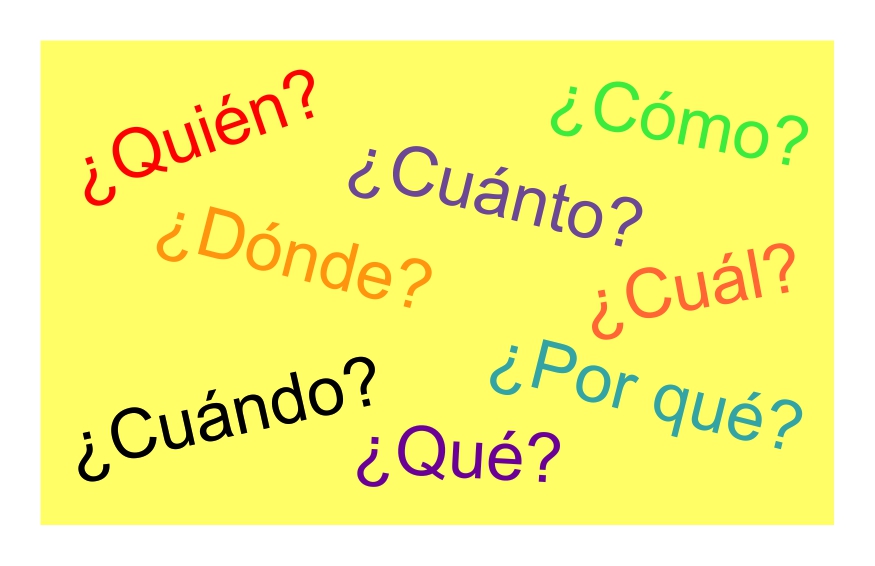 Question Words are useful when asking for information, even if your Spanish vocabulary is limited.
Question Words are useful when asking for information, even if your Spanish vocabulary is limited.
You'll use question words for asking what something means, for making appointments, paying for a purchase, asking for directions, etc.
The words are short and not hard to pronounce, but sometimes it's easy to mix them up.
Click on our Spanish Language Game: 8 Question Words.
This is what you'll learn in Game 3:
• ¿Dónde? - Where?
• ¿Cuándo? -When?
• ¿Cuánto? - How much?
• ¿Cuál? - Which?
• ¿Quién? - Who?
• ¿Cómo? - How?
• ¿Por qué? - Why?
• ¿Qué? - What?
(With Spanish 2 for Travel on our - also completely free - sister site, Lingo-Late.com, you can learn and practice 12 practical questions - quite useful when traveling and looking for directions.)
4. Present Tense of "hablar" - to speak
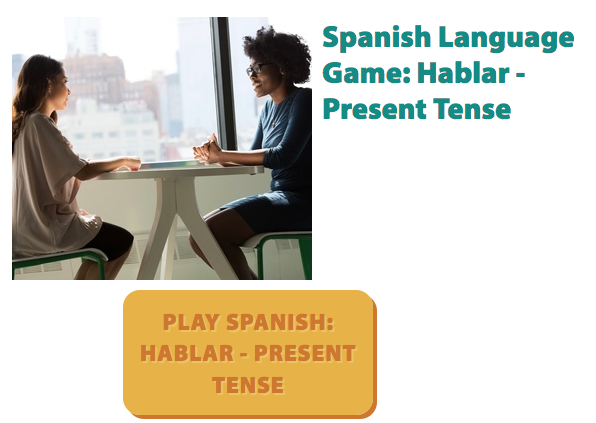 Learning the present tense forms of "hablar" is useful in two ways.
Learning the present tense forms of "hablar" is useful in two ways.
1.You'll be able to express what language(s) you speak or don't speak.
2. You'll learn how to conjugate a regular Spanish verb that ends in -ar.
Click on our Spanish Language Game: Hablar - Present Tense
Here's what you'll learn in Game 4:
• yo hablo - I speak
• tú hablas - you speak (familiar)
• él/ella habla - he/she speaks
• Usted habla - you speak (formal)
• nosotros/as hablamos - we speak (m/f)
• vosotros/as habláis - you (pl. m/f) speak [Spain]
• Ustedes hablan - you (pl.) speak [Latin America]
Besides learning the verb forms, you'll also practice using them in a few easy sentences.
5. Present Tense of "estar" - to be
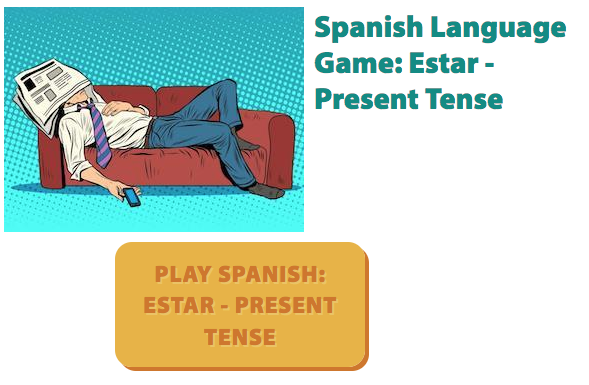 Spanish has two words that mean "to be", but they're used in different contexts.
Spanish has two words that mean "to be", but they're used in different contexts.
This game includes a couple of easy practice sentences for each of these contexts.
Basic uses of "estar":
1. express a condition or state "Sí, lui está cansado!" (Yes, he is tired!)
2. indicate a location
3. form the progressive tense
Note that in Spanish, personal pronouns (I, you, he, she etc.) are often left out unless they are needed for context or clarity.
The pronouns are included at first in the Shootout game, then dropped in some of the easy Word Invader practice sentences.
Click on our Spanish Language Game: Estar - Present Tense
Here's what you'll learn in Game 5:
• yo estoy - I am
• tú estás - you are (sing. familiar)
• él, ella está - he, she is
• Usted está - you are (formal)
• nosotros/as estamos - we are
• vosotros/as estáis - you (pl.) are [Spain]
• Ustedes están - you (pl.) are [Latin America]
• ellos/as están - they are
The Spanish present progressive tense
Note that the present tense forms of "estar" are used to form the "present progressive", the Spanish tense you use to talk about an action that is going on as you speak.
For example: "Estoy buscando la calle Reyes Católicos." (I'm looking for Reyes Católicos street.) Or "Ellos están caminando por el casco antiguo" (They are walking through the old town.) In Spanish, the progressive forms emphasize the continuing nature of the action.
6. Present Tense of "ser" - to be
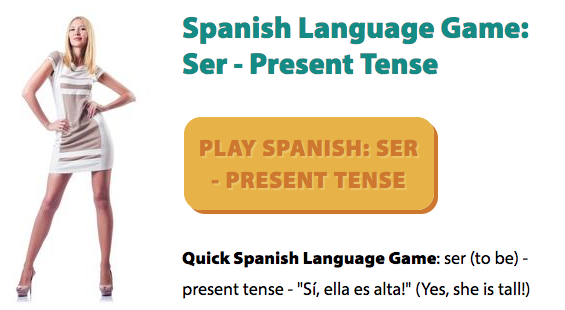 Next, is a game to learn and practice the present tense of "ser" - to be.
Next, is a game to learn and practice the present tense of "ser" - to be.
Some basic uses of "ser":
1. indicate origin, identity
2. time, days, dates
3. indicate essential characteristics - "Sí, ella es alta!" (Yes, she is tall!)
Note that you would use "estar" to say that you are tired - a condition, not a characteristic.
The game includes a few easy sentences for practice.
Click on our Spanish Language Game: Ser - Present Tense
This is what you'll learn in Game 6:
• yo soy - I am
• tú eres - you are (familiar)
• él, ella es - he, she is
• Usted es - you are (formal)
• nosotros/as somos - we are
• vosotros/as sois - you (pl) are [Spain]
• ellos/as son - they are
• Ustedes son - you (pl) are [Latin America]
You can find a more detailed explanation of the uses of "ser" by ThoughtCo HERE
7. Present Tense of "tener" - to have
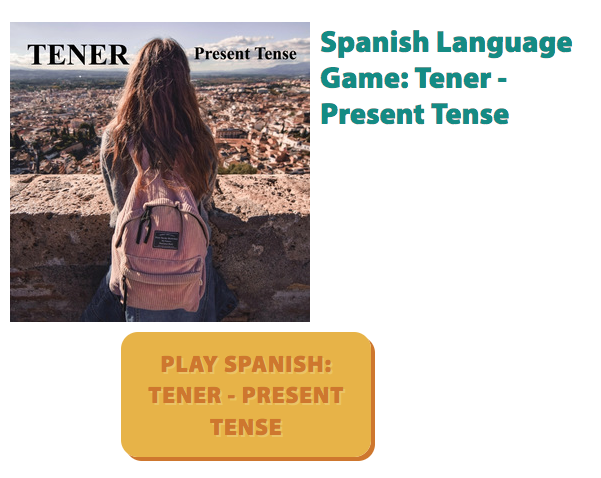 Finally, a game to learn and practice the present tense of "tener" - to have.
Finally, a game to learn and practice the present tense of "tener" - to have.
Again, the personal pronouns are included at first and then dropped in some of the easy practice sentences.
Click on our Spanish Language Game: Tener - Present Tense
Here's what you'll learn in Spanish Language Game 7:
• yo tengo - I have
• tú tienes - you have (familiar)
• él, ella tiene - he, she has
• Usted tiene - you have (formal)
• nosotros/as tenemos - we have
• vosotros/as tenéis - you (pl) have [Spain]
• ellos/as tienen - they have
• Ustedes tienen - you (pl) have [Latin America]
Clearly, a few fun language games won't get you to speak the language with any fluency. But they can put you on the track to learning Spanish, and learning a language is a great life-long hobby.
We have dozens more Spanish games on our site, plus a gamified travel story that will get you familiar with the the sounds of Spanish and basic beginner vocabulary in context. Just a few minutes a day of Spanish adds up very nicely over time.
Apparently, there's a Chinese proverb that says: "Learning a language is a treasure that will follow you everywhere". That has definitely been my experience.
